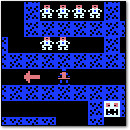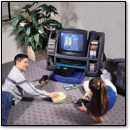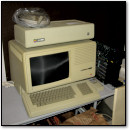[ Retro Scan of the Week ] The BBC Microcomputer
May 17th, 2010 by Benj EdwardsThis scan of an American BBC Microcomputer ad might be of particular interest to our British friends, who may be curious as to how one of the UK’s most famous early PCs was received in the United States. The truth is that the BBC Microcomputer is virtually unknown here. I’ve never seen one in person, and I’d never even heard of it until the Internet era. I suspect US sales of the BBC Microcomputer were limited in part due to the low market footprint of importers like “Fourth Dimension Systems,” as seen in this ad.
I know very little about the BBC Microcomputer (although I’d love to have one, if anyone wants to send a unit over). If any readers out there are familiar with the BBC Micro, I’d be interested to hear some history and trivia about the machine in the comments.
Discussion Topic of the Week: Have you ever owned a British-designed PC? If so, tell us about it. If many, tell us your favorite.







May 17th, 2010 at 11:20 pm
I never had one personally, but I always drooled over the ads for that and the Spectrum in the imported mags my dad got in over here in Australia. (We were a Commodore household.)
I’d highly recommend the BBC Docudrama Micro Men if you haven’t seen it yet, it’s a great take on the rivalry between Acorn’s Curry and Sir Clive Sinclair and is a nostalgia-inducing snippet of the early-mid 80s British computing industry.
May 18th, 2010 at 2:35 am
Oh, and to actually answer the question 😛 , I do have a fully working Cambridge Z88 (Z80 proc., weighs less than 2lbs, precursor to the alphasmarts but sexier) — the one released by Sir Clive after Amstrad bought out Sinclair proper.
May 18th, 2010 at 4:06 am
The BBC was my first computing experience, since it was in so many schools. Lunch would be rushed down so we could get back to the library and load something up. Wish I’d bought one in the late 1980s when I had the chance…
May 18th, 2010 at 11:37 am
The BBC Micro is a great machine – and I’m not looking at this through rose-tinted glasses, I never used one “back in the day”. They can do much more than most other computers of their price range. They’re also incredibly hardy – even when they explode (which most of them do nowadays due to a choice of capacitor in the PSU), they continue working as if nothing happened.
May 19th, 2010 at 9:12 pm
I had one, and used them at high school here in Australia.
It’s probably fair to say they were the most serious of the 8-bit early-80s computers, as a result of it being part of a huge UK push on computer literacy.
It had a surprisingly structured version of BASIC, which included a 6502 assember, and 80-column display mode built-in, running on a 2Mhz 6502 (twice as fast as most 6502-based computers?).
In gaming its greatest achievement was probably that it was the original platform for Elite.
The Wikipedia article has a lot of good info:
http://en.wikipedia.org/wiki/BBC_Micro
May 20th, 2010 at 10:49 am
Neat ad, heh.
We’ve got a ton of machines at The National Museum of Computing in the UK (obviously!). I don’t know enough about them myself but they do function pretty nicely side by side other machines.
Repairs are meant to be relatively easy, I’ll eventually learn how to fix them I think 🙂
May 20th, 2010 at 4:55 pm
Ah, the good old BBC Micro. The BBC B (as opposed to the A) was my first computer. Dad was a producer at the corporation and he got a massive £50 discount as a result. What a great machine. There are plenty of BBC emulators around and tons of great old games. BBC Basic is still available (now ported to Windows) and was recently used to create an algorithm to extract colour information from black and white copies of old colour BBC TV shows. http://www.cix.co.uk/~rrussell/bbcbasic/birthday/index.html
May 21st, 2010 at 9:14 am
Oh man, the BBC Micro model B was my first. 32k of ram and a 5in floppy drive! luxury!
That manual in the picture is what really makes me nostalgic – I had that one, and it was so much better than the kinds of manuals you see these days. Actual technical details on running the machine, and a full explanation of all the BASIC keywords and concepts, frequently with a sample program demonstrating such.
As well as teaching me how to program my own games, which happily has lead me to writing programs for work and play today, there were also some great games. Elite, Repton 3, Clogger, Palace of Magic, Citadel Citadel Citadel – Superior Software Presents Citadel. Holy crap that made me jump.
May 22nd, 2010 at 6:35 pm
I recall reading that the BBC in the US was delayed by Acorn having to rework things to get regulatory approval.
They did create a US version of the optional speech synthesizer chip with an American accent.
It was my first computer (after my father upgraded to an Acorn A5000) and it was a great machine.
May 23rd, 2010 at 9:46 am
I remember using a BBC Master back at school in the very early 90’s. I was the sole member of my Junior school’s computer club. I imagine the Master (which was kind of a beefed up Micro B) never made to the US even in small quantities. I don’t know why, but I always preferred it to the 16 bit Acorn Archimedes that we also had. It was one of my first experiences of computers and for that I’m very grateful.
I later inherited an Acorn Electron from my cousin’s husband. The Electron was a cut down (some might say “crippled”) version of the BBC Micro, designed to compete with the ZX Spectrum and I mostly used it to play the excellent Electron conversion of Chuckie Egg (which I think was also ported to the Atari and Commodore computers). As Neko has already mentioned, these machines are best known as the birth place of ground breaking 3D space trading game Elite.
Needless to say, I’ve got a lot of love for these machines.
May 24th, 2010 at 4:45 pm
I was brought up on a remote Scottish island, so even back in the early 80s, games for the BBC B were scarce. However, my uncle who lived on the mainland also had one, so he very kindly made a tape with a couple of dozen excellent games on it, which kept my brother and I very happy. We were also able to pick up a couple of sets of “10 Best of” compilations in a shop, so we were spoilt for choice in a way. I still have fond memories of the excellent Chuckie Egg on the BBC B.
May 31st, 2010 at 3:25 am
It was my first micro back in 1983. I had the BBC Model B which I vaguely recall meant it had 32K of RAM as opposed to 16K for the Model A – (please correct me if I’m wrong). It came with – and booted into it’s BBC BASIC ROM chip ( a very powerful and superior version to other BASICs in my opinion) and allowed program saves / loading through data casstte. You could buy a Disk OS chip whick allowed you to attach a 5.25 inch external DD. Acorn released upgrade chips to BASIC and the OS later on which I upgraded to. You could also by dedicated program applications on ROM chip and just plug them into an empty socket – database, word processing etc. I bought a Disk utiliies chip program from memory. I taught myself how to program on my ‘Beeb’ (mediocre – nothing professional) which really became a favorite pasting of mine. One thing you could do was embed assembly language routines smack dab in the middle of your BASIC program script, allowing your BASIC program to seamlessly tap into the machine code routines for raw speed. It had a 6502 (2 MHz I think) processor and you could (not sure now with my model) attach a second processor via their patented ‘Tube’ Bus system. The Beeb was really ahead of it’s time and outside of the UK was an unsung hero because their was nothing else around like it for it price tag. It was also the machine which launched the epic classic – truly first of a kind fully 3D wire graphic open ended space game called ELITE, which in itself was probably responsible for helping the sale of the Beeb. Yes me, on my Beeb playing ELITE in my Cobra Mk III roaming the galaxies looking for a scrap saw many years of fun go sailing by…… God I miss my Beeb. I’d better sign off now……I’ve got a bit of sand in my eye.
June 4th, 2010 at 6:29 pm
Interestingly, BBC Micros were still lurking around UK schools well into the mid-90s. My Year 6 (10/11 old) classroom (1996) had one, alongside a 386 running Win 3.1 and a Mac LC that we were ‘given’ by Tesco’s first ‘Computers for Schools’. In 2003, when I had to perform science experiments for my A-Level what computer did all my measurements and control? A BBC Micro B. Even as late as 2007, I saw the occasional Micro lurking around in labs at my university. (Not as a door stop. They looked in use) Not made, but carved from solid. I bet a few are doing their job, unoticed by all until they finally give up the ghost.
June 10th, 2010 at 1:53 pm
I don’t know much about the machine itself, but Acorn (and the BBC Micro in particular) spawned ARM and the ARM processor architecture, now easily the most pervasive 32-bit processor architecture in the world.
When Acorn wanted to upgrade the 6502, they didn’t like what was available in the market, so they designed their own RISC processor internally, the Acorn RISC Machine 1 (ARM1). Succeeding versions of the ARM1 started garnering attention from other big companies, Apple most notably (see Apple Newton). It was then around 1990 that the design team broke off of Acorn as what we know as ARM today (changed to “Advanced RISC Machines” up until a few years ago when all acronyms were officially dropped from the name).
February 8th, 2011 at 1:12 am
Yes! Finally!
These were the only computers we had in our primary school in Australia in the 80s. Even our library ran on them, the librarians actually had to shuffle those big 5 1/2″ disks in and out all day while looking things up and keeping track of our borrowings 🙂 We used to have our own disks as well, to save stuff onto in the computer labs.
They were used for education, I mean learning LOGO, and I skipped all the sports classes and went in to program in BASIC on them using books from the school library and books and magazines from second hand stores that were falling apart from use and neglect.
Two of the big educational games were Granny’s Garden and Flowers of Crystal (still available now… which is a nice way of saying the makers sell them for 15 pounds each packaged up in Windows versions). I’ve been wanting to go back and stir up some memories from my youth. They’re a bit like adventure games, solving some puzzles, trying things in different combinations, etc.
They were pretty cool and I have really fond memories of them. I mean things were different in those days. Not many people had computers, though my friend had an Amstrad CPC we’d go play Bomber Jack on (his family later died in a fire, pretty horrible).
July 6th, 2011 at 1:23 pm
Tristan wrote: “I recall reading that the BBC in the US was delayed by Acorn having to rework things to get regulatory approval.”
That is interesting, as the BBC Micro also got delayed to Sweden due to claimed too high RF radiation or something similar. I always thought that was a lame excuse since the state owned telecommunications company who certified computer models had their own daughter company in the proceedings of developing a custom school computer (Compis) for Swedish use. Since the BBC was so well received in UK schools, they might have been afraid of competition and needed to come up with reasons why it should not be imported, at least long enough that the Compis got to reach the market.
Maybe though there really was shielding/radiation issues that the UK authorities didn’t care about so much but other countries frowned upon.
December 8th, 2011 at 6:20 pm
My college in Scotland had a bunch of these and they were amazing. Rich kids owned them while the rest of us had no sound, no colour Sinclair ZX81s.
BUT, the absolutely best think about them was, if you held the space bar down, the BBC would give a double beep in perfect time with “Tainted Love” by Soft Cell. I remember once, our instructor left the room and our whole class sang every bit of Tainted Love with the trusty BBC doing the double beeps.
Happy days…
August 21st, 2018 at 5:19 pm
Let’s see. I spec and build my own computers (these days mostly Linux-based PCs) and I’m about 90% English, so… yeah, I guess in a way I own and use British-designed computers. Even though I’m a native of the Seattle area.